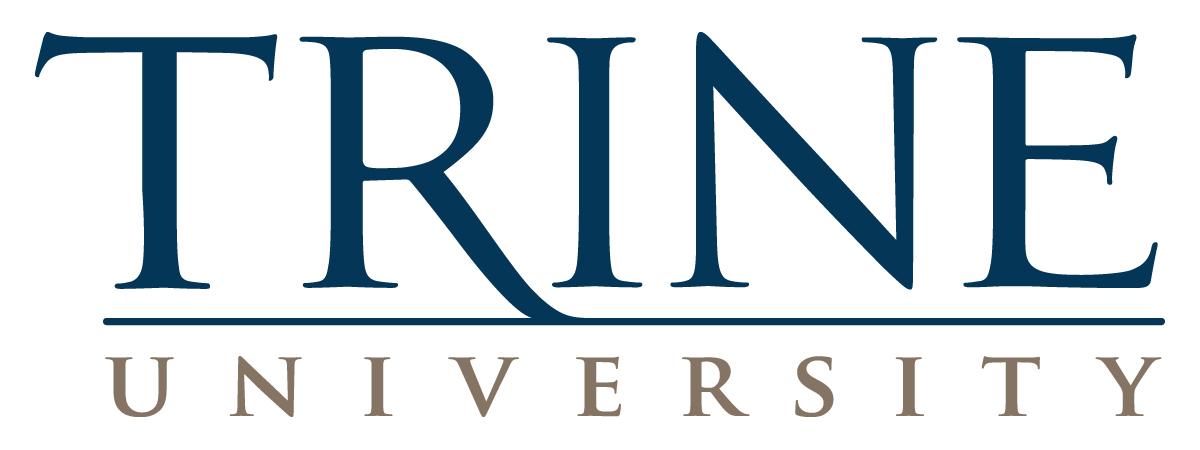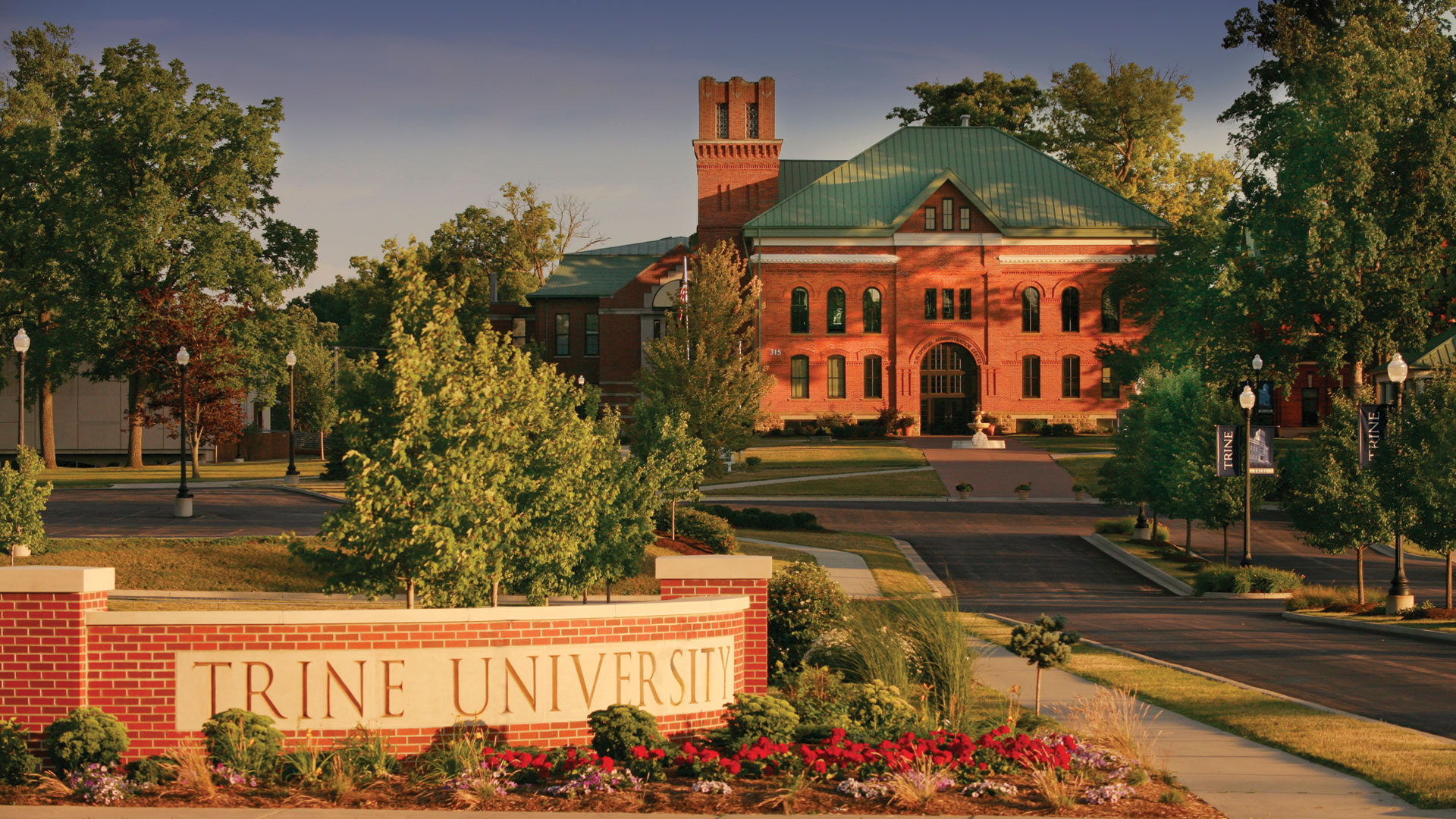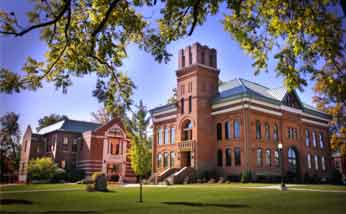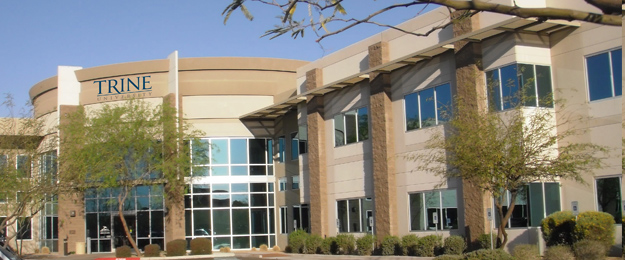Our story is a powerful one. For nearly 130 years now, Trine University has been producing graduates who have literally gone out and changed the world for the better through their knowledge, innovation, and work. And it's a story that continues to evolve every day.
1884
Trine is founded as Tri-State Normal College by the citizens of Angola, Indiana, and the Commerce Building—now known as Taylor Hall—is constructed as the College’s first facility.
1887
The Administration Building, later known as the Sniff Administration Building and now the recently renovated C.W. Sponsel Administration Center, is completed at a cost of $15,000.
1902
The School of Engineering, which today is recognized among the finest undergraduate schools of engineering in the country, is established.
1906
The school reorganizes from Tri-State Normal College and revises the name to Tri-State College, which it will be known as for more than 100 years. Two years later the College completes its third facility, the Recitation Building, now known as Shambaugh Hall.
1922
The “Father of Tri-State” Littleton M. Sniff, who served as the College’s president since 1885, dies in office.
1930
The Administration Building is gutted by fire, and is later rebuilt with the third floor removed.
1959
Professor Emeritus Dr. Allice Parrot authors and publishes The History of Tri-State College 1884-1956.
1960s
The College’s campus undergoes massive expansion, with the addition of seven residence halls, the Perry T. Ford Library, Best Hall, and Hershey Hall. In 1967 the College changes its athletic nickname from the Tri-State Engineers to the Trojans.
1971
Zollner Golf Course opens on the Tri-State campus, and will eventually become one of the most beautiful and popular college golf courses in the country.
1975
Tri-State College gains university status and is renamed Tri-State University.
1984
A century after the College’s founding, Professor Elizabeth Orlosky authors and publishes From Carriage to Computer, the First 100 Years of Tri-State University.
1990
The University changes the nickname of its sports teams from the Tri-State Trojans to the Thunder.
1994
The University opens its Fort Wayne, Indiana education center, followed a few years later with centers in South Bend and Merrillville, as well as the offering of an evening program at the main campus in Angola.
1995
For the first time since the early 1900s, a Tri-State football team takes the field in intercollegiate play.
1997
The University completes a $5 million renovation of Fawick Hall, offering engineering students state-of-the-art classrooms, labs, and computer centers.
1999
Shive Field, Tri-State’s new football field, is dedicated, named in honor of University Trustee Dr. Wayne Shive. Today, the field is arguably the finest Division III artificial turf field in the country.
2000
Earl D. Brooks II, Ph.D., is inaugurated as Tri-State’s 16th president.
2001
The University renovates Centennial Hall and renames it Forman Hall, with the building’s grand entrance named the Trine Welcome Center.
2002
Tri-State is accepted as a new member in the Michigan Intercollegiate Athletic Association (MIAA), the University celebrates its 100th anniversary of excellence in engineering, Witmer Clubhouse is renovated and expanded, and the University receives approval as a graduate degree-granting institution.
2004
Tri-State attains an NCAA Division III provisional membership, opens the $650,000 Ketner Sports Complex, expands the University bookstore, and opens the Trine Villas, offering some of the finest student residence facilities of their kind.
2005
The University graduates its first class of Master of Science in Engineering Technology students, opens the Ingledue Villas, and breaks ground on the $15.5 million Rick L. and Vicki L. James University Center and Center for Technology and Online Resources.
2007
In the most successful Homecoming weekend in its history, the University unveils the Rick L. and Vicki L. James University Center and Center for Technology and Online Resources; the renovated C.W. Sponsel Administration Center; and the University Center, Moss Street, and Kinney Street student apartments.
2008
Tri-State is renamed Trine University, after trustees Drs. Ralph and Sheri Trine, to better define its mission and direction, and construction begins on Golf Course Village, four new student apartment buildings on Zollner Golf Course.
2009
Trine opens the Athletic and Recreation Center (ARC), breaks ground on the transformation of Shive Field into the Fred Zollner Athletic Stadium, and begins renovations on the T. Furth Center for Performing Arts.
2010
Trine opens Fred Zollner Stadium, launches a Master of Science in Biomedical Engineering program, and opens the School of Professional Studies site in Logansport, Indiana.
2013
Trine completes of the Jim and Joan Bock Center for Innovation and Biomedical Engineering. The building features state-of-the-art cast metals laboratories, materials science and metallurgy laboratories, alternative energy studies center, and bioprocess laboratories. It is also the home of Innovation One.
2014
Hundreds join Trine University on the morning of May 2, 2014, to dedicate the new T. Furth Center for Performing Arts. Later that day, the Furth Center officially opened with a concert by award-winning writer and country singer Lee Greenwood.
Trine's Mission
Trine University promotes intellectual and personal development, through professionally focused and formative learning opportunities, preparing students to succeed, lead, and serve.
To achieve our mission, undergraduate and graduate students receive personal attention through small classes and excellent teaching. At Trine, we focus on your future by providing career oriented higher education that emphasizes:
Active participation in classes, with a focus on teaming and collaboration.
The useful and practical, to complement rigorous theoretical study.
Intentional co-curricular experiences to cultivate holistic student development.
Learning how to do, while learning what to do.
Trine's Vision
Trine University will be recognized as a premier private university, characterized as engaged, dynamic, growing, and adding value.
Trine's Goals
I. Academics: Trine University will provide high quality academic programs, actively develop new academic programs and academic experiences, and develop additional program delivery methods that fulfill the university’s mission and academic goals, and prepare students for a career or for additional education.
II. Facilities: Trine University facilities (buildings and properties) will be “state of the art” and will assist in recruitment and retention of high quality students, faculty, and staff. Trine will utilize its facilities to increase the visibility for the university in the region as a major cultural, athletic, and educational center.
III. Enrollment: Trine University will increase its total enrollment in all academic programs at all campuses while retaining its character as a university that recognizes the value of small classes, the need for innovative delivery methods, and the importance of a vibrant residential community.
IV. Finances: Trine University will ensure responsible stewardship of its fiscal and physical resources while expanding its support resource base.
V. Student Services: Trine University will provide outstanding services and support to all students in a safe environment for student engagement and learning, and provide opportunities that promote leadership, academic growth, and professional development.
VI. Technology: Trine University will equip its various campuses and classrooms with state-of-the-art technology as well as the resources and support needed to enhance enrollment, retention of students and faculty, and support for all curricula.
Arts & Sciences
Biology
Chemistry
Communication
Criminal Justice
Cybersecurity
English Studies
Forensic Science
General Arts and Sciences
General Studies (Pre-Legal)
General Studies (Self Designed)
General Studies (Social Studies)
Informatics
Mathematics
Music
Professional Writing and English Studies
Psychology
Business
Accounting
Business Administration
Finance
General Business
Golf Management
International Business
Management
Marketing
Sport Management
Education
Elementary Education
Health/Physical Education
Mathematics Education
Science Education
Social Studies Education
Engineering
Biomedical Engineering
Chemical and Bioprocess Engineering
Civil Engineering
Computer Engineering
Design Engineering Technology
Electrical Engineering
Mechanical Engineering
General Engineering
Health Sciences
Exercise Science
Pre-Medical Professional Track
Pre-Physical Therapy Track
Undergraduate:
IELTS – 6.0
TOEFL – 71
Graduate:
IELTS – 6.0
TOEFL – 71
2013/2014 Price - $36 000




2014 © a2fairs. All Rights Reserved. powered by twopulse.com